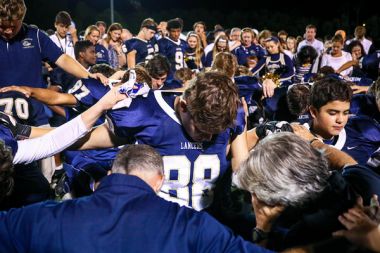73% of Americans support football coaches' prayers during games, survey shows

Seven of 10 Americans are in favour of allowing football coaches at public high schools to lead prayers during games, according to a new survey.
The Public Religion Research Institute released on Thursday its survey on sports and religion which showed that 73 percent, or nearly three-quarters, of the public are supporting the idea compared to 24 percent who are against it.
"There is agreement across the religious landscape on whether this constitutes permissible activity, although the strength of agreement varies," according to the survey which polled 1,009 Americans.
By religious affiliation, 93 percent of white evangelical Protestants agree that football coaches should be allowed to lead players in Christian prayer during games, as do 80 percent of Catholics, 77 percent of non-white Protestants, and 76 percent of white mainline Protestants.
Even 55 percent of Americans with no religious affiliation agree to the proposal while 40 percent disagree.
Last year, Bremerton High School football coach Joe Kennedy was suspended for praying at midfield. He filed a lawsuit against the school district for discrimination.
The survey also showed that 38 percent of Americans or nearly 4 out of 10 regard football as their favourite sport to watch followed by basketball, 11 percent; baseball, 9 percent; soccer, 8 percent; auto racing, 6 percent; and hockey, 5 percent.
"The survey reveals a dramatic generational shift in the popularity of youth sports," said Dr. Dan Cox, research director of PRRI. "Soccer has replaced baseball and softball as the dominant childhood sport in America. Today's young adults are more likely to have played soccer during their formative years than any other sport, the only generation for which this is true."
A total of 62 percent of Americans said they have a generally favourable opinion of professional football compared to 29 percent who have unfavourable view of the sport.
Asked about what bothers them about professional football the most, 32 percent said players are focusing more on money than the game while 21 percent said players are poor role models. One in five or 19 percent cited violence and concussions.











